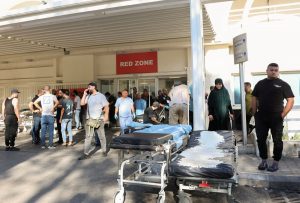The puzzle of how thousands of pagers were sabotaged in an Israeli attack on Hezbollah this past week has sparked investigations into the supply chain behind them, leading investigators to a labyrinth of shadowy companies and individuals spanning Asia and Eastern Europe.
The search for who was behind the manufacturing, sale and distribution of the pagers has pointed to some companies that were created in recent years, with little to no paper trail of their activities and run by mysterious business people with a vague online footprint and little experience in the telecommunications industry.
For decades, Iran and the militant groups it supports, such as Hezbollah, have used shell companies across the Middle East and Mediterranean to obtain funds and equipment while evading sanctions. Israel has in turn created its own shadowy networks to infiltrate the supply chains used by Iran and the militant groups it backs.
Tuesday’s attack is one of a handful of examples in which Israel has likely penetrated Hezbollah’s communications supply chain, said a person familiar with Israeli operations abroad. “But it’s the first time it ended with a bang like this,” he said.
People briefed on the operation said Israel breached Hezbollah’s supply chain and laced the batteries of the devices with explosives. The devices were then detonated remotely.
Hezbollah has begun an investigation into the supply-chain breach.
Who made the pagers?
The pager trail started in Taiwan this past week, after a label on one of the devices that exploded in Lebanon indicated it had been made by Gold Apollo, a Taiwan company. After reporters descended on the company’s offices in the hours after the attack , the company said it hadn’t made the pagers. It said the licensing to make them had been bought by a little-known Hungarian company called BAC Consulting.
Taiwan prosecutors on Wednesday began an investigation to determine whether there are links between Gold Apollo and the attack. On Thursday, national-security investigators summoned two executives from Gold Apollo and BAC Consulting, which operates in Taiwan under the name Apollo Systems. Authorities raided offices of both companies at four locations in Taipei on Thursday. Gold Apollo has denied any links to the attack.
“No specific evidence has been found to suggest any Taiwanese were involved in the terrorist blast attack,” the prosecutor’s office said Friday.
Apollo Systems has rented a co-working space in the Taipei area since April for about $90 a month, according to Taiwan Asset Management Corp., which manages the office space. The company was registered in Taiwan in April, with its listed activities including telecommunication equipment sales, consulting and translation.
In Hungary, BAC Consulting was registered in 2022 to carry out dozens of business activities ranging from selling telecommunications devices to producing computer games. Registered to a sleepy residential area in Budapest, the Hungarian capital, the company had sales last year of some $600,000.
Only one person was registered as both the sole employee and chief executive, a woman named Cristiana Bársony-Arcidiacono , who has a complicated and wide-ranging background. A LinkedIn account for Bársony-Arcidiacono describes her as an evaluation expert on funding for the European Commission. The account says she interned for the International Atomic Energy Agency in 2008-09. Bársony-Arcidiacono didn’t respond to requests for comment.
People who said they knew Bársony-Arcidiacono described her as an elusive figure who would often appear for stretches of time and then leave. In Budapest, acquaintances of Bársony-Arcidiacono said she had a halting command of Hungarian, was interested in drawing, traveled often and hadn’t been seen since the start of the year.
By midweek, BAC Consulting’s website had been taken offline.
Zoltán Kovács , a Hungarian government spokesman, said that the company is a trading intermediary. He said that it had no manufacturing site in Hungary and that the pagers had never been in Hungary.
More companies and countries
A Hungarian media outlet, Telex.hu, reported that pagers were sold to Hezbollah by a Bulgarian company known as Norta Global Ltd. Bulgarian authorities immediately opened a probe into the company, which was registered in the capital, Sofia, by a Norwegian citizen in April 2022, a month before BAC was registered in Hungary.
Since then, Norta Global has transferred a total of 1.6 million euros, equivalent to $1.8 million, to BAC Consulting, according to people familiar with the Bulgarian investigation.
The Bulgarian state security agency said that no pagers like the ones blown up this past week were manufactured, imported or exported in Bulgaria but that it was investigating the company’s involvement.
The company’s activity is listed as “technological project management,” according to Bulgaria’s corporate registry. But little about Norta Global suggests it was very active in Bulgaria.
The firm has no listed employees and is registered at the same central Sofia address as around 200 other companies. The company email address is using a free Bulgarian email service provider. Its registered phone number is Norwegian and went straight to voicemail.
Last year the company had revenue of around $750,000 from consulting activities, according to the register’s data, and made no profit.
A website for the company had been taken offline as of Thursday. An archived version advertised services including consulting, technology integration, recruitment and outsourcing.
“Are you looking for an agile company to help you succeed or to find that tech solution just right for you? Look no further,” the website read.
Bulgaria’s security agency said that the company didn’t carry out financial operations falling under antiterrorism laws and had no business dealings with sanctioned individuals.
Norta Global is headed by a Norwegian national listed as Rinson Jose in corporate documents. On a LinkedIn profile with the same name, Jose is listed as an “entrepreneur” at Oslo-based NortaLink, which provides technology consulting. Its website’s URL isn’t currently in use.
Oslo police on Thursday said an investigation had started in the case. Neither Norta Global nor Jose responded to requests for comment.
Write to Georgi Kantchev at georgi.kantchev@wsj.com , Thomas Grove at thomas.grove@wsj.com and Joyu Wang at joyu.wang@wsj.com







